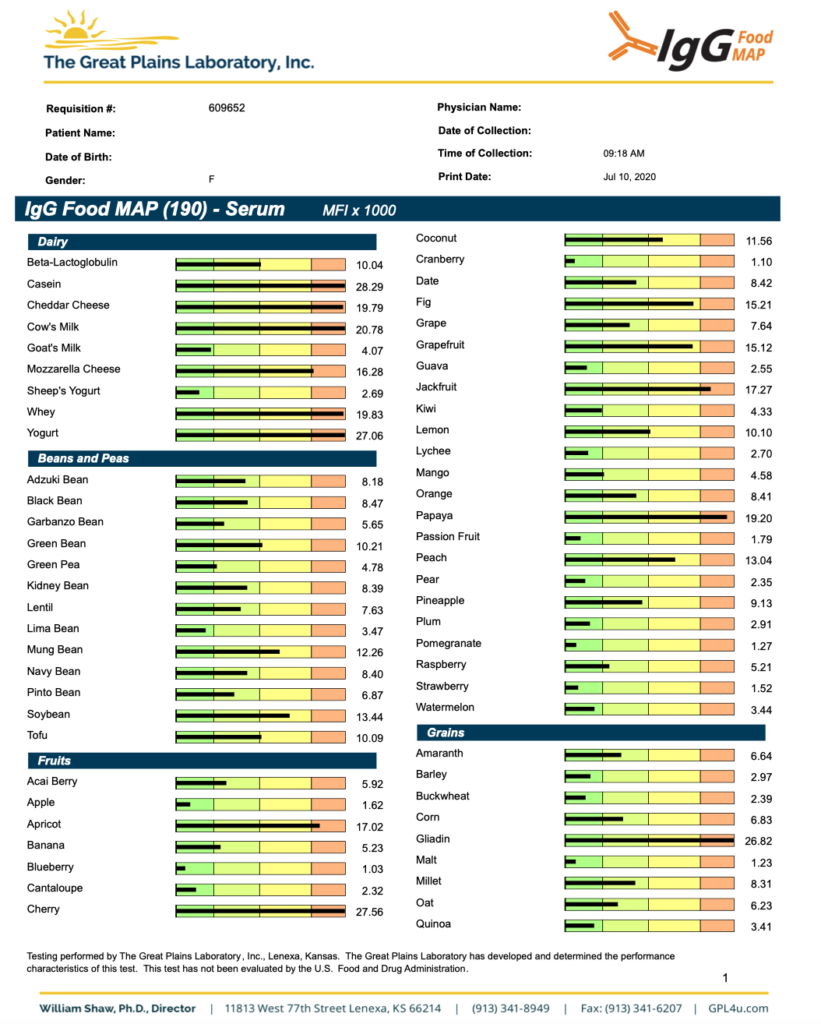Q: I was just wondering if you think the IgG food testing kit from Everywell would work?
A: Perhaps – Everlywell looks like a perfectly good lab. And, it is handy for people to have access to an affordable direct-to-consumer test. However I do have some reservations about finger-prick IgG tests: someone taking immune suppressant meds, or with overall low SigA due to a worn-out immune system (surprisingly common) may get false negatives. (meaning, they actually do have food sensitivities but their test results will suggest things are OK) For this reason I always prefer to go with an actual serum draw (into vials) so Total Immunoglobulin levels can be measured (vs. at-home finger prick blood sample cards).
I’m a fan of this IgG test from Great Plains, which does offer serum testing https://www.greatplainslaboratory.com/food-map-igg-sensitivity-profile. However, a practitioner would need to order this test. (and BTW – there are several other good labs offering practitioner-ordered IgG tests)
My clinical experience of IgG food testing of people with healthy intestinal integrity suggests that people may very well have a few “forever-banned” foods unique to them. For example, my own lab testing shows that my gut is intact, yet I am highly reactive (make IgG antibodies) to lemons, bananas, pineapple, oysters, cabbage, and asparagus. Whereas my son (who also has healthy intestinal integrity) can safely eat all of my IgG problem foods, but he is highly reactive (makes IgG antibodies) to walnuts, pecans, and buckwheat.
I often recommend to my clients they work on alleviating intestinal permeability prior to IgG testing to maximize its accuracy. (see: Intestinal Permeability) Someone with a severely leaky gut may make IgG antibodies to virtually everything they are eating. (I wouldn’t call that false positives, because they actually are making antibodies when eating those foods right now.) But later on some of those foods may actually be OK for that person, if they fix their guts. So I often tell folks receiving their first-ever IgG foods test, these aren’t necessarily your forever-banned foods, but we ought to do some work to improve intestinal integrity/help your body reduce its production of antibodies to those foods before declaring them OK to eat again.
Common root causes for intestinal permeability include glyphosate, gut dysbiosis, and gluten consumption. Going gluten-free, eating organic, and filtering drinking water, are easy at-home steps anyone can take to improve their intestinal integrity. But reducing dysbiosis is a more challenging task – I have my best clinical success combining functional testing, specific herbals, and high doses of specific probiotics. Mold remediation is also called for if functional testing reveals a mold problem. My currently preferred functional lab tests are the Organic Acids and MycoTox from Great Plains combined with stool testing from Sun Genomics.
In conclusion, an IgG test from a direct-to-consumer lab using finger-prick collection cards may be useful for some people, but not everyone. Those with chronic health conditions may benefit from taking a look at the bigger picture including dysbiosis, mold, and intestinal permeability, along with food sensitivities.



